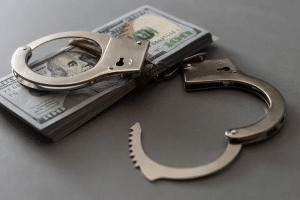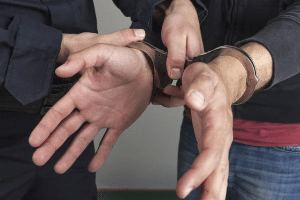
When someone gets arrested, one of the immediate concerns is bail. Paying bail means that you can prepare your defense from outside of jail. However, not everyone can afford this sudden financial burden. So, what happens if you or a loved one can't make bail?
At CBB Bail Bonds, we believe that everyone is innocent until proven guilty. We understand that it can be expensive to post bail or pay bail alone. We can make it easier for you and your family to afford bail. While we believe in bail reform, we want to make it easier for you to make your next court date or court hearing.
Learn more about our services below. Then, call us for help paying bail. Just remember to show up for your court dates!
How Bail Amounts Are Determined
Bail amounts aren't arbitrary; they're set based on various factors. The nature and severity of the crime, the defendant's previous criminal record, and the risk of them not appearing in court are primary considerations. Additionally, community ties, employment, and family connections may influence the amount. Our bond agent can help you with posting bail.
In many jurisdictions, predefined bail schedules provide standard amounts for specific offenses. However, a judge has the discretion to adjust these amounts based on the circumstances of the case and the individual's background.
Remember, the primary purpose of bail is not to punish but to ensure the defendant's appearance in court. Count on a bond agent from our team to help you.
Types of Bail Bonds

- Cash Bail: This is the most straightforward type. You need to pay your bail in cash. The cash will be returned if they attend all court hearings, minus any administrative fees. However, they risk losing the entire amount if they miss a hearing.
- Surety Bonds: A surety bond means multiple parties are involved: the defendant, the court, and a bail bondsman. The defendant or their family pays a percentage of the bail (typically 10%) to a bail bondsman, who then guarantees the full bail amount to the court. If the defendant skips court, the bondsman might contact a bounty hunter for help.
- Property Bonds: Instead of cash, a defendant or their family can use property as collateral for bail. If the defendant doesn't attend court hearings, the court can take your property.
Bail Conditions and Restrictions
Once bail is set, it's not always as simple as paying the amount and getting released. There are often conditions attached. For example, the defendant may be required to stay within the state, avoid contact with the victim, or attend counseling sessions.
Violating any of these conditions can result in immediate arrest and incarceration. It's not just about attending court hearings; it's about adhering to any stipulations the court deems necessary to ensure public safety and the defendant's appearance in court.
Consequences of Not Making Bail

The implications of not making bail are vast. Being in jail can strain personal relationships, impact mental health, and even weaken one's defense.
Pretrial Detention
Pretrial detention can drastically alter the course of a person's life, even before they're formally judged. Being held in jail awaiting trial exposes individuals to potentially harsh conditions, with many detention centers facing issues of overcrowding. Moreover, with each passing day inside, the individual faces heightened risks, from violence to health concerns. The environment is tense, and without proper legal representation, hope can begin to wane.
Extended periods in pretrial detention can ripple out, impacting various facets of life. Personal freedoms are curtailed, cutting off normal routines and daily activities. Maintaining connections with the outside world becomes challenging, leading to feelings of isolation. The detrimental effects of such physical and mental detention can't be understated.
Impact on Employment and Personal Life
The repercussions of prolonged pretrial detention reach beyond the confines of jail walls. One immediate concern is job security; extended absences often result in job loss, leaving the individual with an unstable economic future. Employers, even if understanding at first, might not indefinitely hold a position for someone detained. Such financial instability can strain personal savings and increase dependency on others.
Furthermore, personal relationships often bear the brunt of these prolonged detentions. Families may struggle, especially if the detained individual is the primary caregiver or breadwinner. Children may suffer from the absence of a parent, and partners might face the daunting task of single-handedly managing household responsibilities. The emotional toll on the family unit is profound and long-lasting.
Effect on Legal Defense
Pretrial detention poses significant challenges to one's legal defense. The logistical barriers of being behind bars can hamper effective communication with legal counsel. While lawyers can visit their clients in jail, the frequency and quality of these interactions are often less than ideal. Essential legal activities, like evidence gathering, become more complicated.
Moreover, being detained limits the accused's ability to actively participate in building their defense strategy. Tasks like identifying potential witnesses, recounting events, or even discussing the nuances of the case face barriers. A strong defense often relies on collaboration between the attorney and the client, which detention can stifle. The constraints can, at times, tilt the scales, making a fair trial harder to achieve.
Psychological and Emotional Stress
The emotional and psychological impact of pretrial detention is immeasurable. Even a short stint in jail can be deeply traumatizing, let alone extended periods. The abrupt loss of personal freedom and autonomy and a potentially hostile environment can induce significant stress. This distress is exacerbated by the uncertainty of one's legal situation and concerns about family.
Interactions with other inmates, who might be aggressive or unpredictable, can compound feelings of vulnerability. The lack of privacy, constant surveillance, and unfamiliar routines can be jarring. Over time, this sustained stress can evolve into a major mental health issue. The psychological scars can persist long after release, affecting reintegration into society.
Exploring Your Options
What options do you have when it comes to affording bail?
Option 1: Requesting a Bail Reduction
- Factors Considered in Bail Reduction Requests: Judges might consider factors like the defendant's ties to the community, employment status, and potential flight risk when assessing a bail reduction request.
- The Process of Requesting a Bail Reduction: A defendant or their lawyer can request a bail hearing where they present arguments and evidence for reducing the bail amount. The prosecution can counter these arguments.
Option 2: Seeking Alternative Forms of Release
- Personal Recognizance (PR) Release: This is when the judge releases a defendant based on their promise to return to court. No money or property is exchanged, but you encounter severe penalties if you do not adhere to the terms of your release.
- Unsecured Bond: Similar to a PR release, an unsecured bond allows a defendant to be released without paying money upfront. However, they're legally obligated to pay a specified amount if they fail to appear in court.
Option 3: Exploring Community-Based Programs
- Pretrial Services and Supervision: These programs monitor and assist defendants before trial, ensuring they adhere to bail conditions and appear in court.
- Electronic Monitoring: Some defendants might be released with an electronic monitoring device, like an ankle bracelet, which tracks their location and ensures they're adhering to bail conditions.
Option 4: Legal Representation and Advocacy
- Public Defenders: Public defenders are appointed to represent those who can't afford a lawyer. They can provide guidance on bail and defense strategy.
- Private Defense Attorneys: Hiring a private attorney can offer more personalized representation. They can negotiate bail amounts, present evidence, and build a strong defense.
Resources and Support

- Legal Aid Organizations: These organizations provide legal assistance to those who can't afford it, offering guidance on bail and representation.
- Non-Profit Organizations Offering Bail Assistance: Some groups provide bail money for those in need, especially in cases where they believe the bail amount is unjust.
- Government Assistance Programs: Various programs can offer support, from legal representation to financial assistance.
- Support From Friends and Family: Beyond financial help, emotional and logistical support from loved ones can be invaluable during this challenging time.
How Our Bail Bondsmen at CBB Bail Bonds Can Help You
Navigating the complexities of the bail process can be overwhelming. Our experienced bail bondsmen at CBB Bail Bonds can offer guidance, from understanding bail amounts to ensuring you or your loved one's timely release. We work diligently to simplify the process and offer transparent services to our clients.
With a reputation built on trust and professionalism, CBB Bail Bonds is your go-to for all bail-related concerns in Los Angeles. Our team is available round the clock, ensuring that no call goes unanswered and no concern is overlooked.
Frequently Asked Questions
What is the difference between bail and a bail bond?
Bail is the amount of money set by the court that allows a defendant to be released from jail until their trial. A bail bond, on the other hand, is an assurance provided by a bail bondsman that covers the bail amount if the defendant can't pay it upfront, usually requiring a percentage of the bail as a fee.
Can the bail amount be reduced?
Yes, a defendant or their attorney can request a bail hearing to argue for a reduced bail amount. When deciding on the reduction, the judge will consider the nature of the crime, the defendant's ties to the community, and their past criminal record.
What happens if someone violates their bail conditions?
If someone violates the conditions set during their bail, they risk being arrested and returned to jail. Additionally, they may forfeit any bail money paid and face additional charges or penalties for the violation.
Call CBB Bail Bonds To Get Real Bail Bonds Help in Los Angeles

If you or a loved one faces the challenges of bail, remember: you're not alone. CBB Bail Bonds is here to provide the support and guidance you need during this difficult time. Reach out today, and let our expertise guide your journey towards justice and freedom.
Ensuring your rights and understanding the system is the first step to navigating the complexities of bail. With the right support and resources, you can overcome the challenges ahead. Remember, every situation is unique, and getting personalized guidance suitable for your circumstances is crucial.






